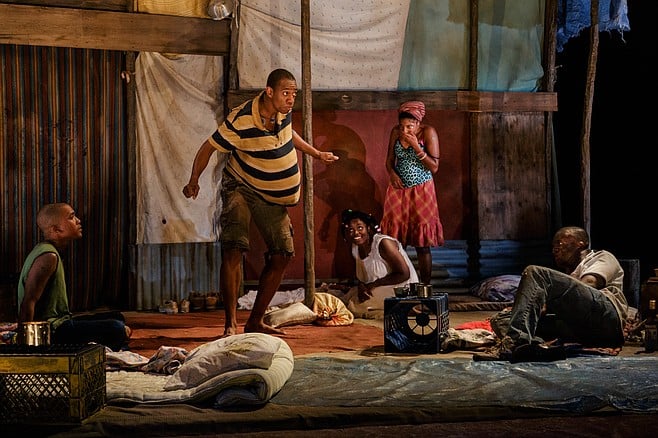In French, “rester avec” sounds pleasant. It means to “stay with.” In Haiti, a “restavek” is a child from a family so poor they cannot support it. Haiti is the poorest country in the Caribbean (it also has the most HIV/AIDS cases in the region: over 120,000). So, poor parents give the child to a more financially stable “host” family.
The child receives food, clothing, and shelter, possibly even an education, in return for housework. In many instances, however, the children become slaves. They labor in the fields and may suffer emotional and sexual abuse. According to C.L. Kennedy (Human Rights Quarterly 36): “The restavek system is tolerated in Haitian culture but not considered to be preferable. The practice meets formal international definitions of modern day slavery and child trafficking, and affects an estimated 300,000 Haitian children.”
The Last Tiger in Haiti
- La Jolla Playhouse, 2910 La Jolla Village Drive, UCSD
- $32 – $92
Jeff Austin’s The Last Tiger in Haiti, in its world premiere at the La Jolla Playhouse, tells the moving stories of five restavek youths. Promotions for the show call it “gripping.” And it is, in the end, though it meanders along the way.
“Born of no one” and belonging “to no one,” the five restaveks labor long hours and feed on table scraps. Their hosts refuse to adopt or educate them (which would make them dangerous). They exist in a semi-war zone, beaten at will by the owners. Some have never known affection.
In the contract, when they turn 18, they can leave. But what prepares them for the “real” world?
It’s the last night of kanaval, 2008. Max (Andy Lucien), now 18, will be a free man in the morning. All he has to do is do nothing. He lives in a ramshackle tent of many colors with skittish Emanuel (Clinton Roane), sexually awakening Laurie (Jasmine St. Clair), irrepressible Joseph (Reggie D. White), and young Rose (Brittany Bellizeare). Given their almost constant dread, an invisible sixth character looms ever-present: the owner of the farm. They call him “Mr.” and “the beast”; he’s more a force than a human being. At the mention of his name, they flinch, as if about to be whipped.
When Max wonders if “Mr.” will come to say goodbye at daylight, Joseph tells him: “He isn’t going to be here to have you thrown away — you’re trash.”
The good news: Mr. will drink to blackout tonight; therefore, “no beatings tomorrow.”
Max becomes torn about leaving. Since Rose arrived not long ago, he has cared for her like a doting father. He’s found a place for his impulse to love. Who will protect her when he leaves for the mountains?
Or for that matter, who will teach the stories of Haitian folklore? A person wanting to tell one shouts “krik.” If people want to hear it, they shout “krak.” The tales the children tell in Act One concern suffering. Laurie’s, about a girl who can sing and move the trees and steals three oranges, concludes with harsh revenge on a “host.” Max tells of tigers who feed off the brains of children and a boy who becomes a man and slays the last one.
Act Two moves from poverty to a Miami Beach penthouse, in the future. Somehow Max and Rose escaped, separately. Unprepared for the outside world, Max became a male prostitute. Now he lives in “Little Haiti.” Rose, engaged to a wealthy man, has written a book about their experiences as restaveks that makes Max a hero. But he wasn’t. She turned his life into a “fable.” Now she must tell the truth.
The Last Tiger has all the makings for high drama. And the ending, where tables turn and turn again, is worth the very long wait. But getting there, in the production and the script, needs rethinking.
Except for a strange noise outside the tent — the drunken owner? a ghost? — and the boffo final scene, the first act is static. The five relate their stories, as if around a campfire. Director Joshua Kahan Brody and his cast create nonverbal mini-dramas with expressive body language. But it’s hard to tell where we’re headed.
Act Two also has static elements, as when an older Max and Rose give a mini-seminar on who should tell a story — and control the narrative. They verge away from the human questions into critical theory.
The production boasts five capable actors — maybe even too capable, since their Haitian accents are so authentic they’re hard to follow. You’d swear Andy Lucien’s in-many-ways-wonderful Max spent his youth in a tent shack. Gestures and nervous glances show a history of subservience and abuse. He’s alert, but only to his immediate world and no further. In Act Two he’s genuinely enraged. Throughout, however, his accent blurs key words and speeches.
The choice of full-on authenticity (also in Dede Ayite’s costumes and Takeshi Kata’s sets, each a tale of two cities) is daring and impressive. It takes us deep into the horrific lives of restaveks. But can a production be too authentic? This one, with much to recommend otherwise, comes close.
La Jolla Playhouse
2910 La Jolla Village Drive, UCSD
The Last Tiger in Haiti, by Jeff Augustin
Directed by Joshua Kahan Brody; cast: Brittany Bellizeare, Andy Lucien, Clinton Roane, Jasmine St. Clair, Reggie D. White; scenic design, Takeshi Kata; costumes, Dede Ayite; lighting, Alexander Nichols; sound, Nicholas Drashner
Playing through July 24; Sunday at 7 p.m. Tuesday and Wednesday at 7:30 p.m. Thursday through Saturday at 8 p.m. Matinee Saturday and Sunday at 2 p.m. lajollaplayhouse.org
